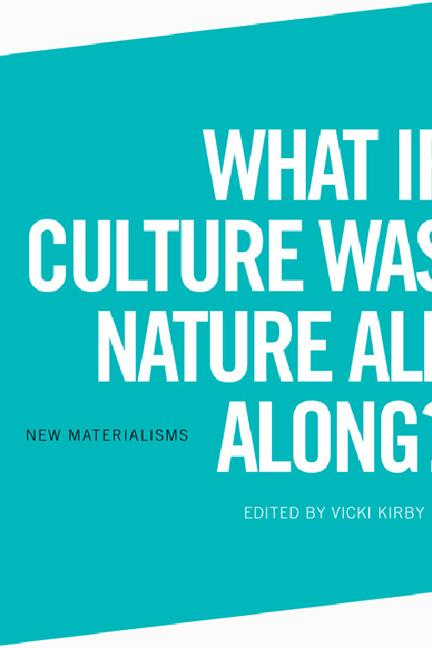Book contents
- Frontmatter
- Contents
- Acknowledgements
- Foreword
- 1 Matter out of Place: ‘New Materialism’ in Review
- 2 Method Matters: The Ethics of Exclusion
- 3 Sensory Substitution: The Plasticity of the Eye/I
- 4 Allergy as the Puzzle of Causality
- 5 Pregnant Men: Paternal Postnatal Depression and a Culture of Hormones
- 6 Material Culture: Epigenetics and the Molecularisation of the Social
- 7 Racialised Visual Encounters
- 8 Microbiology as Sociology: The Strange Sociality of Slime
- 9 Nature Represents Itself: Bibliophilia in a Changing Climate
- 10 Climate Change, Socially Synchronised: Are We Really Running out of Time?
- 11 A Sociality of Death: Towards a New Materialist Politics and Ethics of Life Itself
- Notes on Contributors
- Index
10 - Climate Change, Socially Synchronised: Are We Really Running out of Time?
Published online by Cambridge University Press: 22 December 2017
- Frontmatter
- Contents
- Acknowledgements
- Foreword
- 1 Matter out of Place: ‘New Materialism’ in Review
- 2 Method Matters: The Ethics of Exclusion
- 3 Sensory Substitution: The Plasticity of the Eye/I
- 4 Allergy as the Puzzle of Causality
- 5 Pregnant Men: Paternal Postnatal Depression and a Culture of Hormones
- 6 Material Culture: Epigenetics and the Molecularisation of the Social
- 7 Racialised Visual Encounters
- 8 Microbiology as Sociology: The Strange Sociality of Slime
- 9 Nature Represents Itself: Bibliophilia in a Changing Climate
- 10 Climate Change, Socially Synchronised: Are We Really Running out of Time?
- 11 A Sociality of Death: Towards a New Materialist Politics and Ethics of Life Itself
- Notes on Contributors
- Index
Summary
Concerns regarding the industrialised Earth's changing climate explicitly represent ecological transition as a planet ‘running out of time’. Implicit within this concern is the realisation that it is humans that could be ‘running out of time’, in that climate change threatens to render the planet uninhabitable for our species. This seems to combatively oppose ecological/climate change from human existence, as well as characterising time as an adversarial force whose source transcends humans.
This characterisation of time as both a transcendent source, and as something against which we battle, permeates our everyday experiences. Time provides a regulatory and adjudicatory framework via which we are assessed. This governs short-term intentions such as doing enough work in a day, arriving at social commitments without being late, and making the right bus, as well as longer-term ambitions such as career development or having children. Here we see that time is always apparent, yet there is often not enough of it when we feel we need it. Or in other words, we often feel like we are racing against it.
The clocked and calendared forms of time through which these responsibilities are assessed seemingly derive from an already existing temporality. That is, time is an inherently worldly phenomenon that humans then represent via clocks and calendars (to facilitate social coordination and synchronisation, amongst other uses). What this assumes is that the social construction of time is separate from the phenomenon of time itself. The above paragraph briefly lists situations where we ‘run out of time’ at a social level. What will be considered in this chapter though, is whether climate change discussions that demand time is something of which humans are ‘running out’ indicate that humans are involved in an adversarial relation with time at an existential level. Are we running out of time to get to work on time, or are we running out of time, our time, entirely?
Ecological/Climate Change Represents a Planet ‘Running out of Time’
The argument that the earth is ‘running out of time’ has had no more prominent champion than Denis Hayes, renowned for having dropped out of Harvard Law School to organise Earth Day, the ‘event which gave birth to the environmental movement in modern America’ (Quade 1990: 16).
- Type
- Chapter
- Information
- What if Culture was Nature all Along? , pp. 199 - 222Publisher: Edinburgh University PressPrint publication year: 2017

